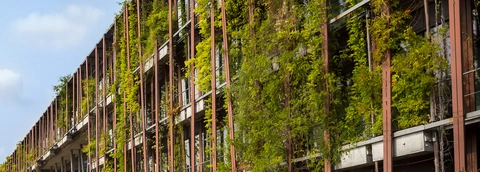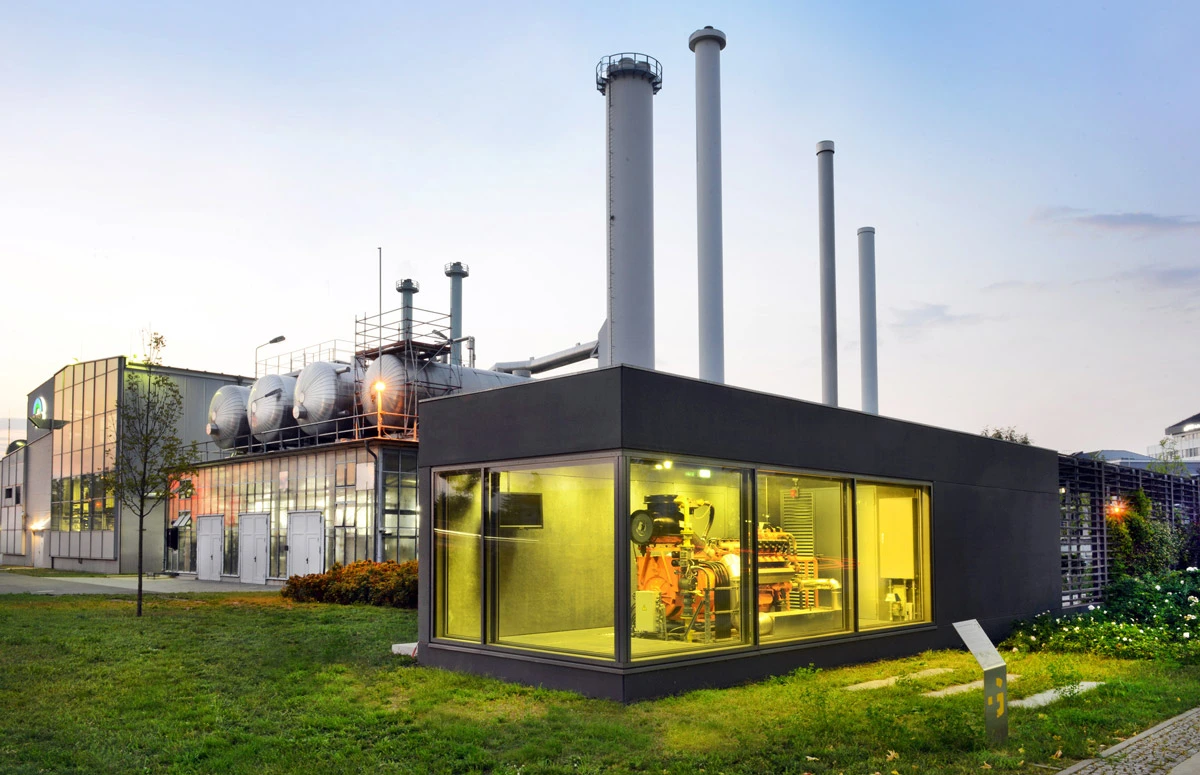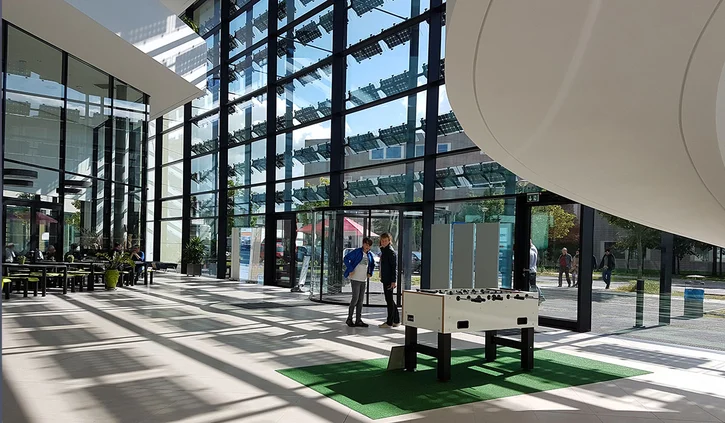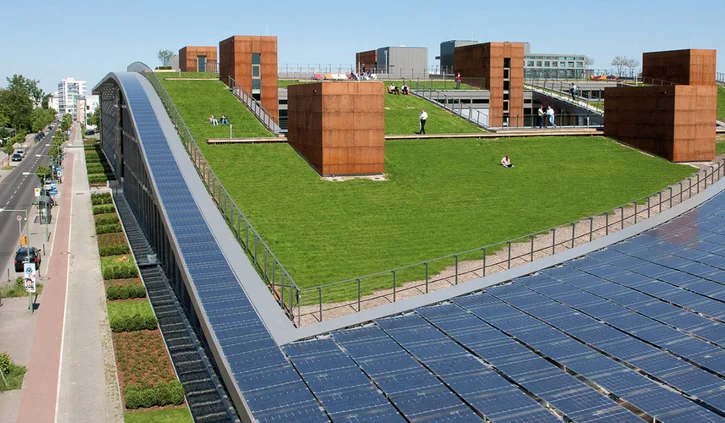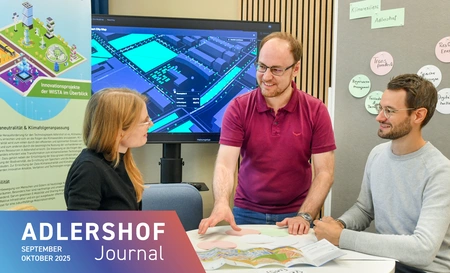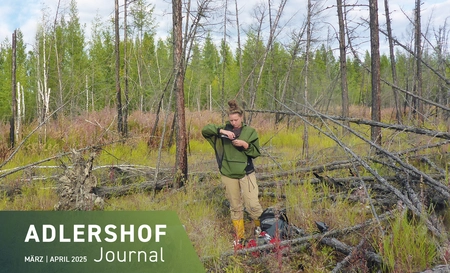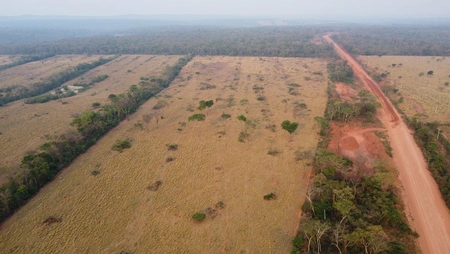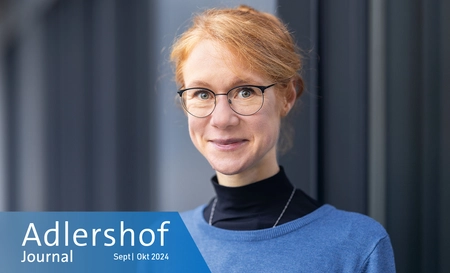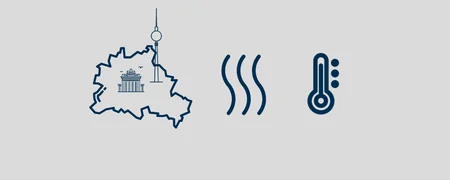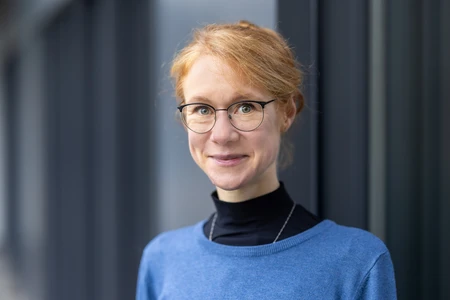Projects for a climate-friendly district
The consequences of climate change and global warming are being felt worldwide. The challenges facing politics, business and science in implementing the agreed climate targets in a timely manner in order to counteract the consequences of global warming are immense.
The Berlin Senate has set itself the goal of making the capital climate-neutral by 2045. To achieve this, energy-saving potential must be identified, energy must be used more efficiently and the expansion of renewable energies must be pushed forward. These factors were taken into account in the planning and development of the Adlershof site. Sustainable and climate-friendly construction and efficient electricity and heat supply are part of Adlershof's DNA. New climate-positive technologies are being developed, researched and tested in this Berlin ‘real-world laboratory’.
The following projects and initiatives are driving climate change mitigation in Adlershof:
Climate change adaption
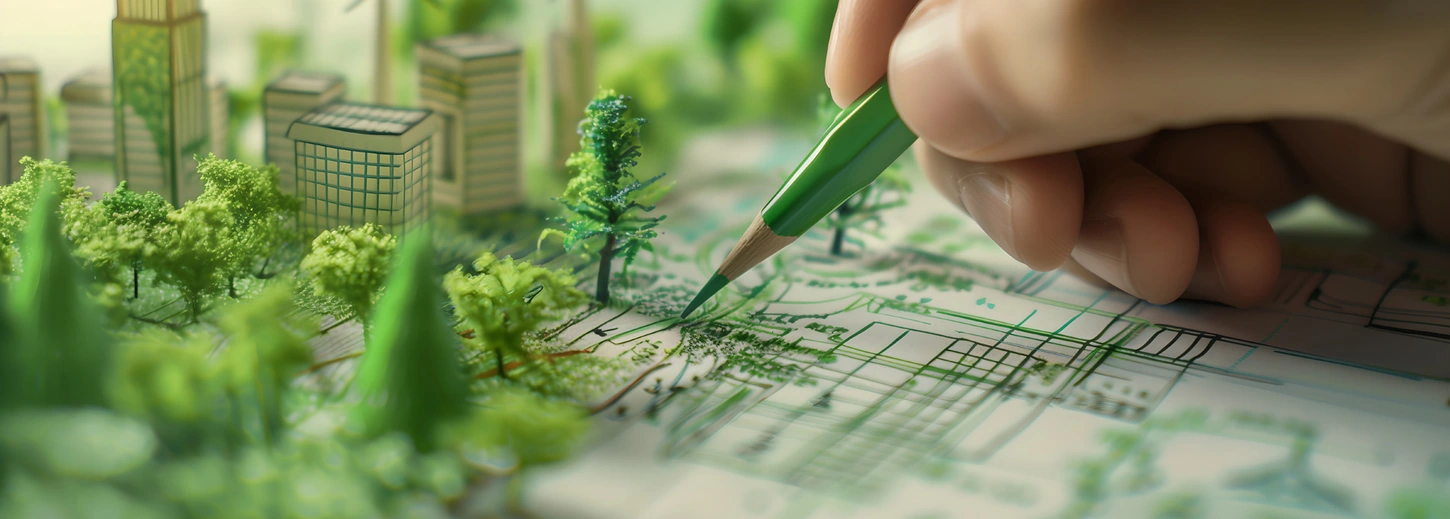
The Adlershof Science and Technology Park is the largest technology park in Europe. The major challenge for the entire site is to achieve climate neutrality and prepare for the consequences of climate change as a requirement for its future viability.
TransformResQ – Master plan for climate resilience
The managing company WISTA is developing a master plan for a climate-resilient Adlershof technology district, which includes feasible measures and their prioritisation in terms of climate impact, costs and feasibility. Two research projects within this initiative, which are being funded by the Federal Ministry for Economic Affairs and Energy (BMWE) with a total of €2.8 million, have been launched and are scheduled for completion by the end of 2027. In the subsequent project phase, the measures developed are expected to be implemented from 2028 onwards.
Energy supply
The local energy supplier BTB GmbH is continuously investing in the renewal of its facilities and distribution networks in Adlershof. Renewable energies already account for around 60% of the district heating network. The aim is to phase out fossil fuels from the heat supply.
To drive forward decarbonisation in energy production, BTB relies on state-of-the-art technologies, including a river water heat pump and highly efficient combined heat and power plants.
In a pilot project, the energy supplier also wants to generate climate-friendly district heating from a seasonal geothermal storage facility in Adlershof. Exploratory drilling by the German Research Centre for Geosciences (GFZ) in Potsdam has identified the necessary deep saline aquifers on BTB's Adlershof site.
Articles about BTB projects in Adlershof:
Energy efficient buildings
Whether photovoltaics, green facades, heat pumps or rainwater harvesting: at the Adlershof Technology Park, various concepts are being implemented to operate buildings in an energy-efficient and environmentally friendly manner.
Examples of commercial/public buildings:
- Media Centre of the Adlershof Lichthaus Group:
Energy generation via a biogas-powered combined heat and power plant and a photovoltaic system on the green roof - Centre for Photovoltaics and Renewable Energies (ZPV):
Gold certificate for sustainable construction with highly efficient energy system, photovoltaic system, rainwater utilisation, green roof - Solar pylon on the Porsche Centre area:
25-metre-high pylon equipped with solar modules that supply the building and the fast-charging station with electricity - Photovoltaics and geothermal energy for energy supply in buildings:
Examples of projects in Adlershof: Solar panels on ZPV, ZBU and other buildings; geothermal energy at FUSS-EMV - Solar power systems in Adlershof:
Report on the first photovoltaic systems in Adlershof: What began as a field of research took off here. - Solar façade on the HZB building as a living laboratory for photovoltaic research
Examples of energy efficient housing projects:
- Powerhouse: First energy-plus housing estate in Berlin's rental housing sector:
128 HOWOGE flats with an innovative energy efficiency concept, energy generation via PV and solar thermal energy, surplus energy fed into the district heating network or electricity grid - Newton Project: Multi-award-winning construction project:
Plus-energy houses with 39 flats, heating and electricity requirements are reduced through insulation and generated by photovoltaic systems, surplus electricity is stored in batteries or fed into the grid.
Mobility
In the field of mobility and transport, there are various projects and stakeholders working in Adlershof:
- Overview of the charging infrastructure for e-mobility in Adlershof in the Berlin Energy Atlas
- Vehicles can be rented for short distances with the Jelbi service in Adlershof, which helps to promote micro-mobility.
- The Reiner Lemoine Institut (RLI) conducts research on the transport transition: projects in the field of mobility.
- Localiser RLI GmbH develops software solutions for planning charging infrastructure.
- The DLR Institute of Transport Research develops transport concepts and tests various approaches for more climate-friendly mobility, e.g. light electric vehicles.
- In the FlexNet4E-Mobility project, it was investigated how surplus electricity can be used to charge electric vehicles.
- Concepts for promoting electric mobility have been implemented in various new construction projects for residential and commercial purposes.
Water cycle
Adlershof is known as a ‘sponge city’ with an exemplary wastewater concept and is well equipped to cope with heavy rainfall. This includes:
- Infiltration of rainwater via swales and troughs: Water is retained on site so that it remains available to the soil for longer.
- Greening of facades and roofs: buildings benefit from an improved microclimate thanks to natural insulation and higher humidity (e.g. green roof on the BESSY II electron storage ring, green facade on the HU physics building).
In addition, rainwater from busy main roads is cleaned in a retention soil filter system and flows into the Teltow Canal.
Consulting services
Helmholtz-Zentrum Berlin
BAIP Beratungsstelle für bauwerkintegrierte Photovoltaik
Initiatives by the scientific community
- Scientists for Future
- Dialogue platform “Helmholtz KLIMA” of the Helmholtz Association
- Sustainability at Helmholtz-Zentrum Berlin (HZB)
- Sustainability Office at Humboldt-Universität (HU)
- HU: Commitment to climate-friendly business trips
- Research for sustainability at the German Aerospace Center (DLR)
- Environmental policy of the Ferdinand-Braun-Institut (FBH)
- State of research on the energy transition: Publications by the German Renewable Energy Research Association (FVEE)
